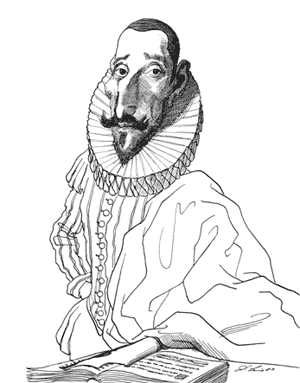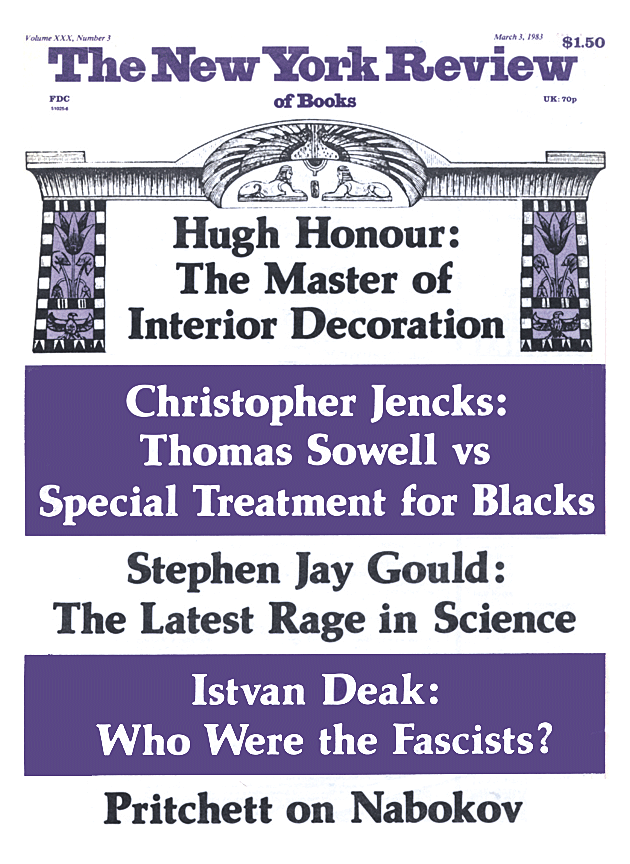When a novelist takes to a bout of lecturing to university students he knows that for him it is sin to live by his mouth. He is throwing away his syntax and his prose; the charms of the impromptu will not work unless he has first gone through the drudgery of preparation. Without his habit of thorough preparation, his dash, his delight in mischief, prejudice, and the cheerfully perverse, Vladimir Nabokov’s lectures would have been no more than pepper and salt. He was an extraordinary preparer. When he came to deliver his course on Don Quixote at Harvard in 1951-1952 he had, for example, gone to the length of writing a summary of the events in this enormous novel, chapter by chapter, so making an invaluable crib. He wrote and rewrote his script, and at once destroyed its virginal look by covering it with corrections, possible asides, alternative paragraphs and optional quotations. He arrived at the lectern with a mass of possibilities.
In collating these martyred pages his present editors have had what must have been an exasperating task; but, for the lecturer himself, the mess was a guarantee of clarity and natural utterance. (There is nothing like a clean typescript for arresting thought and destroying personality.) Nabokov had a special talent for quotation: he knew that students, even those who are keen enough to read, will not have heard the “tune” or real voice of the author’s sentences; that reading aloud tests a style. Then, as a linguist, he had strong views about the merits of Cervantes’s translators. He was equipped also for skirmishes with the well-known Spanish and foreign critics. He found the terse intelligence of Madariaga good, but he loathed the mellifluousness of the learned Aubrey Bell.
Nabokov was amusing on minor disputes too: he was irritated by Joseph Wood Krutch’s claim that Don Quixote was always defeated in his battles. He went to the trouble of reckoning the score of victories and defeats and was delighted to find the score even. And to be sure his students had some idea of what a book of chivalry was, he supplied them with pages of Malory and Amadis of Gaul. Most of us have taken these romances as read. In short, I strongly recommend this edition of Nabokov’s lectures as a practical guide to all incipient lecturers.
Nabokov cleared the ground aggressively at once with his usual de haut en bas:
We shall do our best to avoid the fatal error of looking for so-called “real life” in novels. Let us not try and reconcile the fiction of facts with the facts of fiction…. Don Quixote is a fairy tale, so is Bleak House, so is Dead Souls. Madame Bovary and Anna Karenina are supreme fairy tales. But without these fairy tales the world would not be real.
Don Quixote is a fairy tale about a fairy tale. Not the greatest novel in the world but the supreme fairy tale. True, it is patchy in its narrative. Cervantes is patently improvising for a long time, without certainty of plan. On his dull days he is just filling in to keep the thing going. The stroke of genius is the invention of Don Quixote himself who imparts enormous and growing vitality to the book, so that his figure ends by looming “wonderfully above the skyline of literature”; within twenty years of the publication of the first part, it started to fertilize other literatures, and went on doing so for centuries after it was written. Don Quixote became a universal myth. (And, one might add, has escaped the demise of, say, Don Juan, who has become suddenly unadaptable to our century.)
It is striking, Nabokov continues, that such a figure as Don Quixote should have risen serenely out of the knock-about roguery and low-life meanness of picaresque writing. (On the other hand, isn’t there a gleam of light in Lazarillo de Tormes?) Distressed by his failure as a poet and playwright, Cervantes seems to have thrown himself on the mercy of an intuition which up until his fifties he neglected and despised. He seems to have been slow in seeing a plan; perhaps he intended no more than a short story. He was no good at landscape; he simply followed the painfully artificial tradition established by the Renaissance. Making landscape real and making it work for the story (Nabokov notes) did not appear until the nineteenth century.
What saved Cervantes was a gift that he may have learned as a playwright: the ingenious delight in all varieties of dialogue, high and low. Sancho Panza’s proverbs Nabokov finds boring—in translation—and one suspects he thinks the Russian peasant proverbs superior to the Spanish! The true spell of Cervantes is that he is a natural magician in pure storytelling. He has no mission, no particular social conscience. He is no fiery adversary of social evil. (However, what about those utterances in Part II, about the nature of plain justice and good government? Are we to take these as no more than the traditional Spanish complaint that “good government” is impossible in his country, an impossible dream?) About the cult of chivalry:
Advertisement
Cervantes…does not really give a hoot whether or not books of chivalry are popular in Spain; and, if popular, whether or not their influence is pernicious…. Although Cervantes makes a great show of being morally concerned with these matters, the only thing about this chivalry or anti-chivalry affair that interests him is firstly its most convenient use as a literary device to propel, shift, and otherwise direct his story; and secondly its no less convenient use as a righteous attitude, a purpose, a flutter of indignation which in his pious, utilitarian, and dangerous day a writer had better take.
He had to keep a wary eye on the political and clerical authorities. Equally there is no reason for believing he was either for or against the great power of the Catholic Church. It seems that Nabokov would have no time for the theory that the fun at the expense of the romances of chivalry made Don Quixote the book that “destroyed a nation.”
As for the book being humane or humorous, Nabokov thinks it a veritable encyclopedia of shocking cruelty and brutality, one of the most barbarous books, in this respect, ever written. Its powers to rouse belly laughs is vulgar and nauseating. Most popular humor is brutal and perhaps arises from an attempt to forget the pain. The tossing of Sancho in the blanket is unbearable—though is not Sancho’s own comment on not knowing where he was as he was flung into the air an imaginative one? Even a comment on Quixotism? Of course Nabokov is indignant at the appalling acts of political cruelty of our own time. When his lecture moves on to Part II, in which the “civilized” dukes and duchesses invent degrading torments for Don Quixote, Nabokov is as shocked as we are by sadism as an ingenious or fashionable amusement. But he goes on:
Art has a way of transcending the boundaries of reason…. This novel would have died of the laughter its picaresque plot was meant to provoke had it not contained passages that gently usher or sweep the reader into the dream world of permanent and irrational art….
He is referring to the chapters in Part II when Don Quixote is alone after Sancho has got his promised island. Separated from each other they are unsustained by illusion, and a frightening element in their inner experience emerges, above all for Don Quixote:
Don Quixote…is the maker of his own glory, the only begetter of these marvels; and within his soul he carries the most dread enemy of the visionary: the snake of doubt, the coiled consciousness that his quest is an illusion.
He experiences not “the dark night of the soul” (as one might expect especially from a Spanish writer) but something far more delicate. We see him alone in his room, listening to the singing of the duchess’s maid in the patio. It is that sometimes childlike singing of a soledad. Here Nabokov himself is very perceptive:
The inward hint, the veiled suspicion that Dulcinea may not exist at all, is now brought to light by contrast with a real melody…. He is deeply moved because at that moment all the innumerable adventures of a like sort—barred windows, gardens, music, and love-making—all he has read of in those now strangely true books of chivalry—come back to him with a new impact, his dreams mingling with reality, his dreams fertilizing reality…. But his innate modesty, his purity, the glorious chastity of a true knight-errant, all this proves stronger than his manly senses—and after listening to the song in the garden he bangs the window shut, and now even more gloomy than before, “as if,” says Cervantes, “some dire misfortune had befallen him,” he goes to bed…. This is an admirable scene…. Back to the torture house.
What is Nabokov’s final judgment? That the book is more important in its eccentric diffusion than in its own intrinsic value. Sancho is a bore, his proverbs lose their piquancy in English, but he is most interesting when he himself catches the infection of enchantment. The Don, on the other hand, undergoes a multiplication. He is enlarged by the ingenuity and subtlety of his madness. He embodies the mystery of reality and illusion. He is courageous to a degree.
We are confronted by an interesting phenomenon: a literary hero losing gradually contact with the book that bore him; leaving his creator’s desk and roaming space after roaming Spain…. We do not laugh at him any longer. His blazon is pity, his banner is beauty. He stands for everything that is gentle, forlorn, pure, unselfish, and gallant. The parody has become a paragon.
The students who listened to Nabokov used Samuel Putnam’s careful, slightly bland translation but also J.M. Cohen’s, which Nabokov often preferred. If they were able to turn to the Spanish the students would have discovered the sustained and luminous irony of the style, irony enhancing the subtlety of experience without any cruelty or dryness. From Nabokov they would have got stimulus. Fascinated by structure in his own work, he was very interesting on the growing ingenuity of the book. The introduction of the imaginary Arab author and of the notorious false version which stirred Cervantes to rise to the height of his powers in Part II were complexities very much up Nabokov’s street. The only protest I have concerns his offhand comment on the redoubling of illusions in the grand scene at Montesinos’s cave. That famous episode may have started as “another twist that Cervantes gives to the Enchanted Dulcinea theme in order to keep the reader entertained and Don Quixote busy.” But what a powerful, critical, and dramatic elaboration of the theme of illusion it is. It amounts to a sight of imagination imagining itself.
Advertisement
This Issue
March 3, 1983



